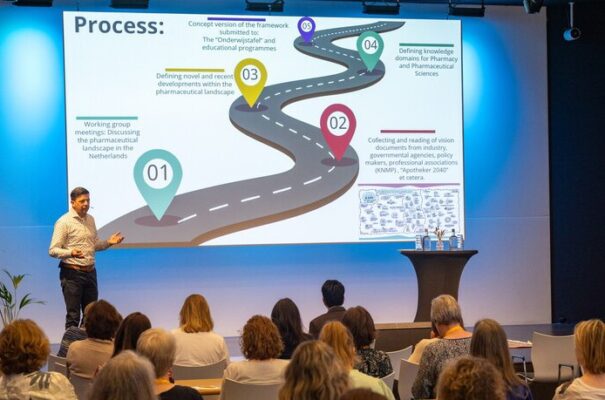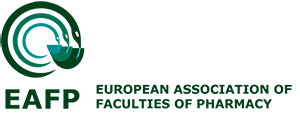National Education Congress in the Netherlands
On April 10, 2025 the 3rd National Pharmacy Education Congress was organized in Amersfoort (the Netherlands). The congress was organized by the Charlotte Jacobs Institute (responsible for the Dutch postgraduate community pharmacist specialization programme) on behalf of the KNMP (Royal Dutch Pharmacists Association), NVZA (Dutch Association of Hospital Pharmacists) and the three Universities offering Pharmacy and Pharmaceutical Sciences programmes (Groningen, Leiden and Utrecht). The congress was visited by almost 100 teachers from the Netherlands, six Flemish colleagues, and several students. The congress was highly interactive; the major part consisted of 17 workshops in three parallel rounds. A diversity of topics was covered, such as team-based learning, chemistry education, interprofessional collaboration with respect to prescribing, gamification, use of Artificial Intelligence, diversity, motivation, role of critical thinking. Workshops were presented by teachers from all participating study programmes and interaction between teachers from different departments was stimulated. It is remarkable that – even in small country as the Netherlands – such a highly diverse educational landscape exists, where the organization of curricula is influenced by local University structures and research priorities. Nevertheless, exchange of ideas between teachers from different programmes touched upon common themes and inspired new collaborations.
An important part of the congress was the plenary presentation of a new version of the ‘Domain-specific Frame of Reference for Pharmacy in the Netherlands’, which is going to replace the existing Frame of Reference, which dates from 2016. The framework describes the knowledge domains, the present and future developments, and the general tasks and responsibilities of pharmacists and pharmaceutical scientists. In contrast to the existing version, the new version will also cover the area of pharmaceutical sciences and will define a few new domains in addition to the existing domains ‘product care’, ‘patient care’, ‘medication policy’, ‘quality assurance’ and ’research, education and innovation’. In the near future, the frame of reference will be the basis of an explicit description of an updated national Competency Framework for both pharmacy and pharmaceutical sciences education. An analysis of existing trends (e.g. sustainability, medicine pricing, shortages of medicines and staff, new technologies, interprofessional collaboration, aging population) was presented to the audience and participants were asked to express their opinion with respect to several issues, which are under debate at this moment.
The congress nicely illustrated that much is to be gained by interaction between teachers from different educational environments in terms of collaboration, stimulation and inspiration. As a personal note I can say that – after being involved in pharmacy education during the last 25 years – the Dutch educational community has grown from a small group of pioneers to a vibrant community of involved and committed teachers, which can be found in all pharmacy and pharmaceutical sciences programmes of the country. The congress participants evaluated this 3rd congress with a 8.5 grading (on a 10-point scale).

